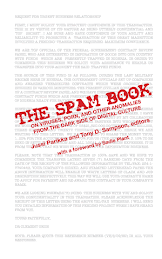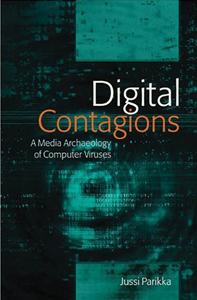It reminds first of all of the trick (real or folk lore) of inserting just a random image of a penis-in-action between film frames in the manner mentioned in the film Fight Club. The mind might not immediately notice what happened, but the brain and the nervous system registers that something was not right. It's tempting to put your Zizek-hat on and start talking about ruptures in the fabric of the real world by an intrusion of something-that-does-not-fit-in. An unmotivated penis in the field of vision surely does that.
In such a manner, the thousands of porn clips posted on Youtube can be seen as such ruptures of expectations, of the narrative of the world to but it a bit metaphorically. Yet, we could as much claim that such a rupture is actually what holds together the logic of the Internet, and its the libidinal desires, the dirty side of us/our networks that maintains the libidinal economy and circulation. Its the anomalous that keeps the supposedly normal intact.
It took me three paragraphs to get to the point of flagging the new review (Mute magazine) by Luciana Parisi of Matteo Pasquinelli's Animal Spirits. Parisi's review is highly recommended. It picks up on the key strengths and weaknesses of Pasquinelli's book, and resonates with some of the points I made in my review of the same book for Leonardo Digital reviews. Pasquinelli is able to complexify many of the dualisms haunting the supposedly liberating discourses of network culture and point towards the much more intriguing evil energies circulating through bodies, through networks. In the midst of the assumed free software and commons movements lies an assumption of the natural goodness of the human being (also targeting Chomsky) which neglects the at times implicit structurations of power that define any act of creation and cooperation. In other words, as also Parisi summarizes, the idea of freedom and non-rivalry of digital information hides the facts of "immaterial conflict" of living labour. To quote Parisi: "This conflict includes the economy of references, the race to meet deadlines, the competition for festival selection and between festivals and 'the envious and suspicious attitudes among activists' (p.49)."
Parisi also picks the point of critique that I did in my review. Pasquinelli's critique against the code-theorists, and what seems to extend towards the whole of software studies, is way too broad and remains vague. Reading "code" and theorists of code only through an interest in codification that neglects the living materialities of the flesh, so to speak, neglects the more nuanced work done in software studies. Many of the theorists there, and who have paid attention to the concrete assemblages and practices of software as the key relay of network culture, have developed much more thoughtful ways of taking into account why code and software are not to be seen only as symbolic material but as Parisi writes, such modes of abstraction that involve energetic relations. I have recently tried to write about "ethologies of code" and point to the way how code should not be seen as representational and it should not be reduced to its function of codification of the intensities of any real of fleshy bodies. Instead, also code and software can be seen working through notions of relationality, affect and intensities of such relations. In the context of Pasquinelli, and Parisi's review, she writes: "Codes are not simply binary systems of simulations that hide living conditions of existence. Codes are real abstractions that have an energetics equivalent to flesh and blood despite remaining utterly irreducible to any physical system. Pasquinelli's insistence on the meta-structure of coding and the under-structure of living labour ultimately overlooks the materiality of code. Furthermore, by taking code culture at its face value, he ignores the weird and prolific underworld of esoteric software cultures."
I find Parisi's point excellent, and as said, something I have been developing is strongly in tune with this. Of course, the earlier projects on viralities and parasites tried already to take into account of such "animal energies" in network cultures, but the more recent paper is even more closely targeted on "ethologies of software." Indeed, such points flag the need to be more aware of the dirty energies inside software cultures as well -- the genitals and all in the field of not only vision but code.








No comments:
Post a Comment